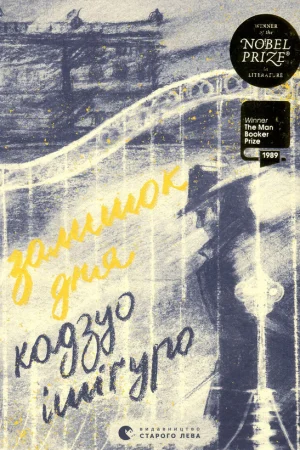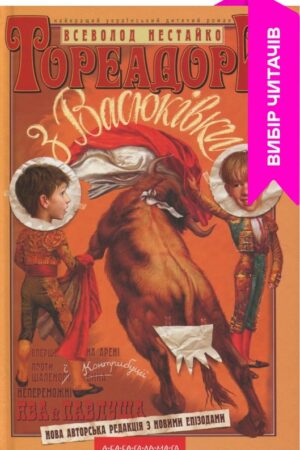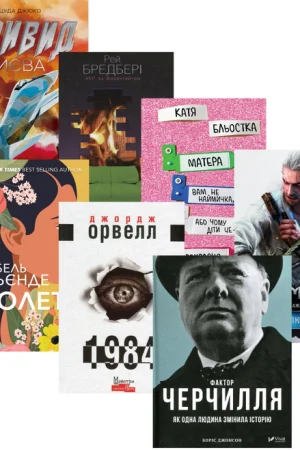 The rest of the day
The rest of the dayBuy Ukrainian Books / The rest of the day
Buy Book "The rest of the day" in Ukrainian
$22.95
Free Shipping Worldwide
for orders over $4999

Залишок дня
Кадзуо Ісігуро
Kazuo Ishiguro
The rest of the day
Why You Should Buy “Favorite Poems (Set of 3 Books)” by Ivan Malkovych
“Favorite Poems (Set of 3 Books)” is a remarkable collection that captures the essence of Ukrainian poetry. Here’s why you should consider adding it to your collection:
- Cultural Significance: Delve into the rich traditions of Ukrainian literature.
- Diverse Themes: Explore various emotions and life experiences through beautifully crafted verses.
- By Renowned Author: Enjoy the works of Ivan Malkovych, one of Ukraine’s most celebrated poets.
- Ideal Gift: A perfect gift for poetry lovers or anyone interested in Ukrainian culture.
- Collector’s Item: A unique addition for collectors interested in Eastern European literature.
Key Milestones in “Favorite Poems”
- Introduction to the world of Ukrainian poetry.
- Exploration of love, nature, and identity through verses.
- Culmination of themes that resonate with both local and international audiences.
- A journey through the vibrant history and culture of Ukraine.
If you want to buy “Favorite Poems (Set of 3 Books) in Ukrainian”, look no further! We offer an incredible selection of Ukrainian literature.
Strong Points of Our Service
- Best Prices: Enjoy competitive pricing and great discounts.
- Fast Shipping: Receive your orders swiftly from Kyiv and Lviv.
- Rare Book Assistance: We help you find and purchase rare books from Ukraine.
- Support Ukraine: A portion of every purchase goes to the Ukrainian army.
- Flexible Payments: We accept PayPal, Visa, Mastercard, and other banking cards.
- Worldwide Shipping: Deliveries through Ukrpost, USPS, UPS, and DHL.
Don’t miss the chance to enrich your literary collection with “Favorite Poems (Set of 3 Books)” by Ivan Malkovych. Order now and connect with the beauty of Ukrainian poetry!
Additional info
| Weight | 0.36 kg |
|---|---|
| Year | |
| Cover | |
| Pages count | 240 |
| Page size | 60 |
| Original title | Залишок дня |
| Author |
Related Categories
8 reviews for The rest of the day
4.75
/5Based on 08 rating(s)
Customer's reviews
Sort by
-
Svetlana
This is a very calming and atmospheric novel that helps you reflect on the past and analyze what has succeeded and what is irrevocably left behind.
The main character is the highly skilled butler James Stevens, who invested all his life and strength in his master. The destinies of many European countries and political figures of the twentieth century were decided before his eyes, as many prominent political figures and stars came to James Stevens’ master’s house. He was devoted to his master until his last days and imagined no other life. And when the house was sold and the aged butler met the new, more active and progressive owner of the estate, he began to wonder if he had done everything right in his life, if he had missed any chance. He had not made family (though he had had the chance) or friends; he had completely dissolved into his former master, who had certainly appreciated him, but Stevens’ work and personality had not allowed him to have a personal life. And even meeting his former love did not change Stevens, who, even in his old age, puts duties before feelings.
A slightly sad, unhurried but magnificent story about how life passes, many things cannot be returned, and one must appreciate what fate gives.
September 23, 2020Verified PurchaseHelpful?
Reply -
Marina
For me personally, this book was the third Ishiguro novel I have read. From this master of the word you should not expect an explosion of emotions, terrific love lines or historical globalism. No, Ishiguro is a subtle psychologist and philosopher. He knows how to show the drama of a devoted butler against the backdrop of an era. His master at one time misjudged his political preferences, failed to appreciate the scale of Nazism and the personality of Hitler. As a result, he died alone, abandoned by all. Devoted butler Stevens thinks so much about work that he spends the best years of his life serving a man who doesn’t need it. Instead of truly falling in love and marrying a beautiful woman, he stays true to his job and his duty. It is not until years later that Stevens realizes that he has made a mistake and tries to correct his mistake, but it is too late. His fate is to return to his new master’s house and serve him faithfully until his old age.
Is the work worth giving up your personal life for? Perhaps if we are talking about outstanding creative individuals, scientists, composers. But you wouldn’t call Stevens outstanding. Yes, he is a butler, albeit an excellent one. If he had married Miss Kenton, he would not have ceased to be an excellent butler. But then, twenty years ago, did he think of loneliness? And whose fault was it that he was alone?
January 1, 2020Verified PurchaseHelpful?
Reply -
Olesya
If we compare The Remainder of the Day with the two books by Kazuo Ishiguro that were published in Ukrainian earlier, it is easy to find differences: this novel is not as hopelessly sad as Don’t Let Me Go, and not as allegorical and parable-like as The Buried Giant. Instead, there is something that unites them and is obviously a characteristic feature of this author’s style: melancholy, unhurriedness, and thoughtfulness.
In 1956, Stevens, no longer a young butler, takes a several-day road trip, during which he often recalls the turning points of his life. For many years he served in the large estate of an exemplary English lord. “I gave Lord Darlington my best,” he says. But the old lord has been dead for three years, and now the estate is run by an American rich man who is establishing a new order. He doesn’t care about centuries-old traditions, most of the rooms are empty and locked, and the number of staff has been reduced from 28 to four. How does our hero, Mr. Stevens, the butler in the square, who has devoted his entire life to service, feel when he observes these inevitable changes, when he sees his entire world disappear right before his eyes? There’s also a complicated history with his former master.
September 23, 2019Verified PurchaseHelpful?
Reply -
Ivanna Baranovska
“Kazuo Ishiguro’s The Remainder of the Day is one of the most beautiful and sophisticated books I’ve read in a long, long time.
The author, a native of Japan, was able to convey that unique atmosphere of England, thus creating the greatest English novel. And it was a pleasure to read it!
James Stevens is a butler who has spent most of his life in the service of the Darlington Hall estate. In the past, he served Lord Darlington, and after his death, he served Mr. Farraday, an American gentleman who bought the estate along with his staff.
The story begins with the American inviting Stevens to take a short trip while he himself is away for a while. This unexpected journey will awaken the butler from his sleep with many memories of his past. As he recalls his life of service, Stevens involuntarily thinks that some moments could have turned out differently if he had shown certain emotions or said things he would have preferred to keep silent.
He talks a lot about the dignity and selflessness of the people he served.
August 12, 2019Verified PurchaseHelpful?
Reply -
Natalia Kolehina
Stevens may be a high-class butler, but I don’t understand what kind of person he is.
Stevens reminisces a lot, reflects, talks about dignity. But it turns out that it is precisely human dignity that he lacks. He has no opinion of his own. For Stevens, there is no doubt.
Stevens is artificial. He has no name. He is unable and unwilling to show emotions. Not even to get close to Ms. Kenton. He doesn’t respect himself. It is difficult to sympathize with a person who has no respect for himself.
In the story of Stevens-his life in a box or his lost chances-I did not see any refined and aristocratic Englishness.
If at a time when it was necessary to show feelings: to send his father off to a better world with dignity, this man thinks only about work and his status. I don’t understand him at all. I don’t understand how you can suppress your human and personal for the sake of work.
I don’t know what I’m supposed to feel about Stevens. Friendship? Because he is a decent man. Compassion? Because his status requires equanimity and rejection of emotions. Rejection? Because he suppresses his humanity, destroys his personal. Condemnation? Because he is constantly pretending to be something, has no opinion and, ultimately, no assessment.
And here is an interesting quote that makes us think about what honor is and whether everything we call honor is honor.
“What you, sir, call amateurishness, most of us call honor.”
June 3, 2019Verified PurchaseHelpful?
Reply




![Buy {title[1]} in Ukrainian](https://uabooks.us/wp-content/uploads/2023/05/img_0239_6-300x450.jpg)
Leave feedback about this